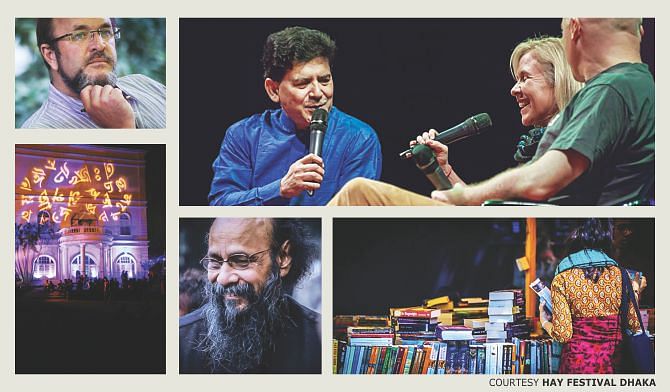Hay Fever

Dhaka has the annual Ekushey BoiMela, an extravagance of books and celebration of our local authors, many of whom we are already aware of. However, Hay Festival Dhaka is quite the opposite. Selling books is not the focus, rather it's a side-benefit. The main attraction is to meet and interact with stellar International authors. Then comes the mad rush afterwards to buy their book and get it autographed.
The Hay Festival Dhaka is the first of its kind that introduces authors from abroad; provides a platform for our local authors who write in English; and highlight our traditional literary practices to the outside world. Attendees were spoilt for choices with so many authors to interact with, all on the hallowed grounds of Bangla Academy.
Two years ago, we got to meet Vikram Seth, author of the global best-seller, A Suitable Boy. Last year, Tariq Ali came back to Dhaka after more than forty years, a firebrand leftist originally from Pakistan and a supporter of our quest for independence. From the one-day event on the grounds of British Council, it has grown from strength to strength, with visiting authors, related events, and performances multiplying. The highly anticipated November weekend is an orgy of intellectual treats, literary readings, and running from venue to veny not to miss the sights and sounds of personas we only get to read about or follow on Twitter. Biting into a kebab roll, you could also have the good fortune to meet international publishers looking for local talent to promote and publish abroad.
This year, Zia Haider Rahman – a British author of Bangladeshi origin, introduced his book, In the Light of What We Know, to the Hay audience. Lauded internationally, his debut delves into classism of the British society as experienced by someone like him. The audience was quick to claim him as one of our own, but he persisted in his self-proclaimed global citizenry. Then there was William Dalrymple, whose enactment of historical events is a story-telling performance extraordinaire that had the audience mesmerised. Shashi Tharoor proved why he was a star in the UN and later in the Indian Foreign Service through his erudite brilliance; while Jung Chang made the alien world of Chinese philosophy attractive and palatable.
Among the Bangladeshi authors featured this year were Maria Chaudhuri and Javed Jahangir among others. The latter's book, Ghost Alley, i.e. Bhooter Goli, a local landmark, touched on the fractured lives of a family affected first by Partition and then Independence War.
All together more than sixty luminaries that encompassed not just literature, but also mathematics, philosophy, journalism, history and publications, came and spread their insights in over eighty sessions. On Saturday evening, it was hard to believe that the Festival was over for the year. Many of us yearned for more. Yes, we definitely and willingly had Hay Fever.
M.K.Aaref is a writer, architect, and CEO of the EMK Center in Dhaka.

 For all latest news, follow The Daily Star's Google News channel.
For all latest news, follow The Daily Star's Google News channel. 



Comments